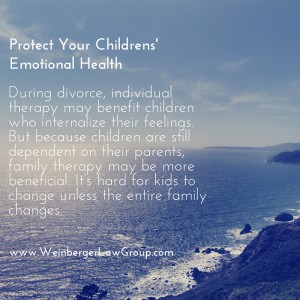How Do You Know It’s Time To See A Divorce Therapist?
Not everyone who goes through a divorce will need a therapist. If you don’t share property and children, and you are emotionally resolved about your decision, you may not feel the need for extra support. If you do have children and/or own property together, however, divorce can feel apocalyptic. You may fear losing your home, your financial security, and time with your kids. You may feel unable to keep your fury towards your spouse in check, or you may have sunk into a state of depression. Sound familiar? Here are some signs it may be time to see a therapist who specializes in easing people through divorce transitions.
You’re using your friends as your therapist: Finding yourself venting compulsively about the emotional aspects of your divorce to your relatives, friends, or even your children’s nanny? These people all have specific functions in your life that do not include therapy. If your sister seems to be avoiding your calls and you see your friends’ eyes glaze over when you bring up your ex yet again, it’s probably time to bend the ear of a divorce therapist instead.
You’re experiencing symptoms of depression and anxiety. It’s common to have trouble sleeping and eating when going through a divorce, but if you go too long without enough of either, you may find yourself in a clinical depression. If you’re experiencing panic attacks, crying bouts, or find yourself struggling to get out of bed, you need to see a therapist and possibly a psychiatrist, who is able to prescribe medication if necessary.
You can’t manage your anger. Most people going through a divorce feel bursts of anger and resentment towards their ex. But if you find yourself unable to stop screaming at your ex, especially in front of the children, or, worse, if you have intrusive thoughts of exacting revenge, get to a therapist pronto. Learning coping skills to keep your anger in check can prevent you from jeopardizing child custody or traumatizing children who witness your outbursts.
Your children are struggling. Some children are naturally more resilient and adjust to life changes on their own. But divorce can destabilize more vulnerable children. Common signs that a young child needs extra support include: having tantrums, acting out in school, difficulty transitioning between households, a refusal to go to one parent’s house, and frequent somatic complaint such as headaches and stomach aches. Divorce trauma in older kids may manifest in drugs use, defiance, compulsive sexual activity, and trouble in school. Individual therapy may benefit children who internalize their feelings. But because children are still dependent on their parents, family therapy may be more beneficial. It’s hard for kids to change unless the entire family changes.
You don’t know how to handle your high-conflict ex. If you have a particularly acrimonious divorce, you probably have trouble disengaging emotionally from your ex. You may spend an inordinate amount of time obsessing about the ways he or she appears to be damaging your children’s well-being. You may find yourself sending or receiving hostile e-mails and texts. You may be white-knuckling your way through your days, wondering when he or she will haul you into court yet again. This is no way to live! A therapist trained in divorce can help you find ways to manage your reactions to your ex so that you can focus on your children (not your ex’s relationship with your children) and start functioning normally again.
Therapy requires a financial and time commitment, but with the right practitioner, the benefits far outweigh the cost. If any of the above scenarios feel familiar, do yourself and your children a favor by getting to a therapist post-haste. Life is too short to spend it mired in your divorce.
Your peace of mind matters. For legal support in your divorce, our caring and trusted Weinberger Divorce & Family Law Group, LLC attorneys can help. Please contact us to schedule a consultation.



